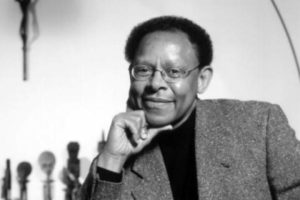A week before the election I was in a group of clergy where we were sharing our anxiety about the election, expressing our apprehension that Donald Trump would be elected president, and casting about for the meaning of it all. During this conversation one of my friends asked several times, “Is this a Bonhoeffer moment?” His question kept hanging in the air.
I want to answer his question in the affirmative. Yes, it is a Bonhoeffer moment, and by that I mean it is a time for us to consider what Bonhoeffer wrote from prison after he failed in the attempt to kill Hitler.

Richard Hester
I believe all theology that matters is the outcome of some profound crisis, some historic turning point, and for Bonhoeffer the crisis was the Nazi state and its demonic attempt to destroy the Jewish people — among many other atrocities. From his imprisonment, in his “letters and papers from prison” he expressed theological ideas we need to hear as we wait for the outcome of this election and the possibility that another Hitler, another fascist, will be elected president.
And the alternative outcome — that if Donald Trump is defeated in this election, he will relentlessly try to overturn it by violent means. “A bloodbath” he predicted, should he lose the election.
Theology that matters
Bonhoeffer wrote this in a letter of July 18, 1944: “Man is challenged to participate in the sufferings of God at the hands of a godless world. He must therefore plunge himself into the life of a godless world, without attempting to gloss over its ungodliness with a veneer of religion or trying to transfigure it. He must live a “worldly” life and so participate in the suffering of God. … It is not some religious act which makes a Christian what he is, but participation in the suffering of God in the life of the world.”
“We all wanted to avoid the kind of suffering we imagined would be our fate if Trump were elected.”
As I heard it in our conversation, we all wanted to avoid the kind of suffering we imagined would be our fate if Trump were elected. I certainly wanted then and want now to avoid that eventuality. Bonhoeffer directs us into that suffering, and that is the theological territory we land in, like it or not.
Theology that matters comes out of situations of profound crisis. That’s my argument. Consider these examples:
- The crisis of the Babylonian Exile (597-538 BCE) which led to the development of the Torah.
- The destruction of Jerusalem and the temple by Rome (70 CE) in the aftermath of which the Gospel of Mark was written to provide an orderly account of the life, death and resurrection of Jesus.
- The separation of Christianity from Judaism that occupies a central place in the letters of Paul (c 48-64 CE).
My last example is the lynching of 5,000 Black people in the period of Reconstruction after the Civil War — which is a further chapter in 400 years of slavery and racial oppression in America. What theology has come out of that? James Cone, who is regarded as the father of Black Liberation Theology, took on the challenge to understand the horror of the lynching of Black people in light of the crucifixion of Jesus. He saw this as the heart of his Black Liberation Theology.
He wrote:

James Cone
The question that preoccupied me was this: How did African Americans survive and resist the lynching terror, while maintaining enough sanity to love each other and marry, raise their children, and teach them love and respect? Faith in God and in themselves is what kept many Blacks emotionally and spiritually healthy enough to love not only themselves but also to reject hatred. … The cross is a part of the Christian condition, so long as the world remains unredeemed. It is the answer to oppressed people who struggle for liberation. It remains at the center of the gospel of Jesus, and it remains at the center of black life in the United States, in the form of the lynching tree.
The horror of lynching is in my blood, flowing throughout my body. The images of lynching appeared in my dreams. And yet, strange and paradoxical as it may appear, I discovered that it was Black people’s identification with the cross on which Jesus was brutally crucified that kept many of them out of a madhouse. That was why they sang with passion, ‘Jesus Keep Me Near the Cross.’ It was their faith in Jesus’ cross, believing that if God was with Jesus, God must be with us, because we are also on the cross.”
Cone wrote that lynching could take other forms than hanging people from a tree. One form was burning Black people at the stake — often in the presence of large crowds of white people. Today’s prison industrial complex, which Michelle Alexander has called “the New Jim Crow,” is a current example. Shooting Black people in racial conflicts with whites is another example. Shooting Black people or strangling them or otherwise killing them in police custody is yet another form of lynching. The murder of George Floyd in 2020 is a prime example.
Cone wrote about the mystery of Black refusal to give in to hatred:
It is a mystery, a profound and deep mystery, how many African Americans, even after two and a half centuries of slavery and another century of lynching and Jim Crow segregation still refuse to allow themselves to be infected with hatred. Nothing illustrated this more than the families of the ‘Emmanuel Nine,’ the Black Christians who were murdered in Charleston, South Carolina, as they attended a Bible study in their church. Their families offered forgiveness to the young white man, Dylan Roof, who had so coldly shot their loved ones. That was a profound religious achievement.
Then Cone wrote that “the cross is a paradoxical religious symbol because it inverts the world’s value system proclaiming that hope comes by way of defeat, that suffering and death do not have the last word, that the last shall be first and the first last. … Only people stripped of power could understand this absurd claim of faith. The cross was God’s critique of power — white power — with powerless love, snatching victory from the jaws of defeat.”
James Cone and Donald Trump
What do these examples of theology being born out of crisis have to say to you and me today as we face the prospect that Donald Trump could be elected the next president of the United States, and that if he isn’t so elected he will call for a bloodbath to overturn it?
To answer this theological question, we must begin with the question: “Where does Trump draw his power?”
“Where does Trump draw his power?”
How does a man who is utterly unqualified to be president acquire such remarkable power? The answer to that question, I believe, is that Trump has tapped into the fear that white supremacy in this country is endangered and that he is leading the quest for the preservation and protection of that white supremacy. All other criteria that qualify a person to hold the office of president are dismissed as irrelevant so long as his followers can believe he has a single-minded mission to protect white supremacy no matter what the cost.
This mission ties Trump’s power to both Dietrich Bonhoffer’s and James Cone’s theology. Bonhoeffer is in the custody of Hitler, the dictator of Germany who has succeeded in exterminating 6 million Jews — an act of mass murder without historical parallel — in an effort to eliminate a whole race of people who Hitler says are a threat to the supremacy of the Ayrian race in Germany. Cone’s views are based on 400 years of slavery and Black oppression culminating in the lynching of 5,000 people in the effort to maintain white supremacy in the United States.
The parallels between Trump and Hitler are striking, and this is clear in Trump’s repeated unfounded claim that immigrants are responsible for a crime wave in the U.S. and that when he becomes president he will deport all these people, thus saving the country from this menace — a menace that doesn’t exist. In this narrative, immigrants represent all people of color — all who now, in the minds of Trump and his followers, threaten the majority status of white people in this country.
Theological meaning
In light of this interpretation of where Trump gets his power and the parallels between Trump and Hitler, what theological meaning can we draw from this?
I begin with Cone’s claim that the cross is a paradoxical religious symbol that inverts the world’s value system, because it says that hope comes by way of defeat and that suffering and death do not have the last word. Then he makes this assertion, “Only people stripped of power could understand this absurd claim of faith.” He goes on to say the cross is God’s critique of power — white power— “with powerless love, snatching victory from the jaws of defeat.”
“A theology for our present crisis is going to come from Black suffering and Black people who find hope in that suffering.”
These words suggest to me that a theology for our present crisis is going to come from Black suffering and Black people who find hope in that suffering.
I follow up Cone’s claim with Bonhoeffer’s words from prison.
“It is not some religious act which makes a Christian what he is,” Bonhoeffer wrote, “but participation in the suffering of God in the life of the world.”
This brief statement tells us two things. First, that God suffers in the world. God is not some detached being who is above it all. God suffers and calls us to suffer with God. What does this mean? It means we “must plunge ourselves into the life of a godless world, without attempting to gloss over its ungodliness with a veneer of religion or trying to transfigure it.” This means we must find out where God suffers and go there to suffer with God.
What does this have to say to our desire, should Donald Trump win this election, to move to Canada — or some other place that is separate from the chaos and pain that we believe he’ll bring our way?
It says, “Don’t duck and run. Stay and suffer with God because God is certainly going to suffer here. And look to brothers and sisters of color because they are the ones who know the way through the wilderness.
Richard Hester is professor of pastoral theology, retired, from Phillips Theological Seminary, Tulsa, Okla. and Southeastern Baptist Theological Seminary, Wake Forest, N.C. He led the Southeastern Seminary faculty opposition to the fundamentalist control of the school. He completed his career as senior therapist at Triangle Pastoral Counseling, Raleigh, N.C., where he established the Narrative Therapy Seminar. His forthcoming book, Theological Education in a New Key: Narrative, Belonging, Diversity, is to be published in January 2025.
Related articles:
Congressman John Lewis is my choice in this election | Opinion by Richard Hester
Bonhoeffer family and scholars warn against Metaxas and Christian nationalists
Bonhoeffer Moment No. 3: When conscience fails and hypocrisy prevails | Opinion by Bill Leonard
What happens when church and state merge? Look to Nazi Germany for answers


